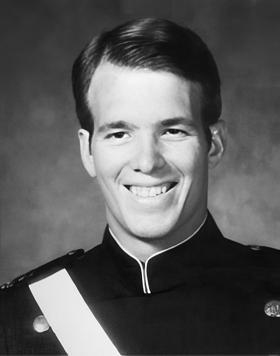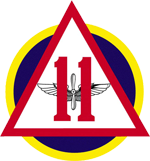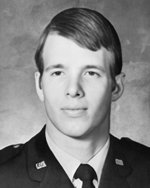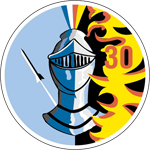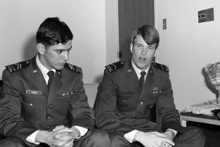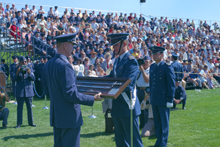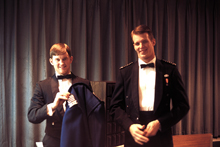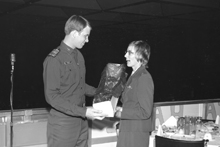 |
|
|
John (JT) Wolter passed away unexpectedly on Dec 19th, 2008, from complications of a staph infection. He was 55 years old. John was born in Houston, Texas, though his father’s Air Force career led his family to a number of different states, eventually bringing him to Honolulu where he met Meg Paty, his future bride, at Punahou. After graduating, John chose to attend the Air Force Academy, where he would forge close friendships with his classmates in the Class of 75 and the years surrounding while learning the necessary skills to serve his country. He and Meg were married in the Air Force Chapel shortly after he graduated from pilot training in 1976. Through various assignments they spent time living in Arizona, the Philippines, Alabama, Virginia, Washington (where their two children were born) and North Dakota, where John served the country as a leader and pilot. He eventually returned to the Academy as a squadron commander in 1985. It was as AOC of the Squadron 16 Chickenhawks that he won the O’Malley Award, given annually to the most outstanding squadron commander. While serving his country for 14 and a half years, John flew the B-52, C-9, the C-141 and the T-41. When told his flying days were over, John left the service to work for United Airlines, where he flew the 747, 737, and the Airbus 320. He was that rare man who truly loved his job, and his passion for flying was unparalleled. He thrived on travel, being with people, and he relished the breathtaking view of the world afforded by the cockpit (although it was privately suspected that his love for international cuisine was also a major motivating factor in his choice of career). Perhaps the most defining characteristic of John was his effervescent personality, highlighted by an uncanny ability to become fast friends with complete strangers. He loved good food, funny jokes, and loud music. Among his many passions were books, sushi, exercising, neckties, and the Beatles. His favorite vacation destination was without question the islands of Hawaii, where numerous extended family and copious amounts of local foods awaited him every summer. Perhaps his greatest passion was twofold: The God he served and the family that had been entrusted him. He became a Christian through an Academy chaplain in his college days, and would come to view spending time with God as his most treasured pursuit. This was apparent in all facets of his life: no sacrifice was too great for those he loved, and his time on earth, at its core, was characterized by an attitude of service. One way this was apparent was in his tireless efforts to bring the Family Life Marriage Conference to Colorado Springs. He and Meg spearheaded this ministry for five years. He is survived by his wife, Meg, of 32 years, an occupational therapist and family counselor in Colorado Springs; son David, currently studying animation in Los Angeles; and daughter Lindsey, who lives with husband, Tom Elliot, in Seattle. Lindsey and Toms welcomed John’s first grandchild, Greyson Thomas Elliot, into the world this past March. In addition, John is survived by his parents, Col. (Ret) John and Doris Wolter of Lincoln, Neb., and brother Tim Wolter and family of North Carolina. A memorial was held January 2nd at Village Seven Presbyterian Church, the day after John was buried at USAFA cemetery. David Wolter, John’s son | January 2009
John Wolter, 55, passed away Friday, December 19th from complications of a staph infection. John was born in Houston, Texas, though his father's Air Force career eventually brought him to Honolulu where he met Meg Paty, his future bride. Upon graduation from the Air Force Academy in 1975 and completion of pilot training, he married Meg and they embarked on a 14-year career during which John served his country as a leader and a pilot before eventually returning to the Academy as an Air Officer In Command. When told his flying days were over, John left the service to work for United Airlines where he flew the 747, 727, and the A320. He was that rare man who truly loved his job. He thrived on travel, being with people, and he relished the breathtaking view of the world afforded by the cockpit. His effervescent personality was highlighted by an uncanny ability to become fast friends with complete strangers. He loved good food (especially sushi), loud music (especially the Beatles), loud neckties (over 100), and funny jokes (he boasted a treasury rumored inexhaustible). He lived with almost blinding intensity, yet somehow always found time to connect with others. His greatest passion was twofold: The God he served and the family that had been entrusted to him. No sacrifice was too great for those he loved, and his life at its core was characterized by an attitude of service. He is survived by: Parents, John and Doris, brother Tim and family, wife Meg, son David, and daughter Lindsey and husband Tom Elliott, who await the arrival of John's first grandchild this March. His memorial service will be held 1:00 pm, January 2nd at Village Seven Presbyterian Church. Colorado Springs Gazette | December 28, 2008
EUOLGY (Read by JT's son David at his Memorial Service): The fact that a simple song can contain startling amounts of joy is a truth my father believed and one he taught to me. Songwriter Mack Gordon once compared life to a song. And I wonder now, if life is indeed like a song, how my father's would have sounded. I imagine it beginning in the hushed tones of a quiet, obedient child, as this life offered its pleasures to my father slowly at first. Childhood stories speak mainly of good behavior, organization, and a sweet disposition. The pace quickened, however, in 1963 when he discovered, along with the rest of the country, the music of the Beatles, and through them, rock and roll in all its myriad forms. Funk, soul, jazz, even disco swell in frenzied fullness to a multi-colored, leisure suit-clad crescendo of what I can only call the "dancing days" of his young adulthood. Even well into his fifties, his sense of being alive somehow increased in direct proportion to the volume of the music being played. And he liked it loud. Despite all this, my father as a young man remained shy and reserved in the sometimes-deafening silence of reality. But all that would change when at age 17 he happened upon the love of his life in a Honolulu high school classroom, a tall brunette beauty named Marguerite. Those who have met my father even briefly may find it hard to believe that he was too shy to approach her, choosing instead to send a friend to gauge her interest in being his prom date. Her consent began a relationship that would ultimately serve both to further realize his strengths and cause him to search his own uncharted depths. The winds of change began to stir at once. Two dates later, he casually announced to Meg's mother, "I'm going to marry your daughter." Despite this confidence, photographs from the marriage which followed some six years later reveal that shyness remained; it was almost as if eye contact with the camera was too much to ask. The details of the marriage and family that followed exceed the scope of these thoughts, so I will only remark here that while we never suspected my father of perfection, we never for one instant doubted his love and devotion to us. So, in considering my father's life as a song, I believe its richness suggests a full orchestra, but which instruments? I believe there are four: Without question, beneath it all, the relentless, dance-able beat of a large bass drum, for the intensity my father hurled at life. Never content with being average, he constantly tried to exceed the possibilities allowed him. One example of this is the fervor with which he applied hand cream. No digit, no inch, no renegade wrinkle was spared. Inevitably the light would turn green before he had finished. And he would begin the time-honored dance of knee steering and would recruit as gear-shifting accomplice whichever child happened to be riding shotgun, all while continuing to moisturize with redoubled vigor. Extrapolating this behavior across a lifetime will give an idea of why some have suggested he must have known he wouldn't live past 55 – why else would he tried so hard to fit in so much. For the second instrument, I find the warm brass tones of a horn section appropriate, for the joy my father wrung from the furthest corners of life. He was a man who took simple pleasure in many things: his family, good jokes, loud neckties, going for a run, when the Broncos or Cornhuskers win, and being a pilot. Although it has long been suspected that his love of flying, though substantial, was only a thin disguise for the true impetus behind his career choice: namely, food. A casual eavesdropper overhearing his flight schedule might suspect him for an itinerant restaurant critic, for a destination was never mentioned without including which culinary delights awaited him there. Thanks to my father, Reno, Nevada will forever live in my memory as the country's number one destination for fresh sushi. Music was another great source of joy. I distinctly remember being awoken from an afternoon nap by a gentle thumping from the basement. When I silently peaked my head downstairs, I witnessed firsthand my father's workout routine, which as far as I could tell, consisted of equal parts weightlifting and watching himself dance in the mirror. The music of the Beatles was as constant a presence in my childhood as sunshine or playgrounds. I can still see my father, head back, eyes closed in pleasure and exertion, joining Paul on the high notes, and adding his own brand of vibrato with small shakes of his head. Truly, music touched a place deep in my father few other things could reach. The third instrument is perhaps the awkward oboe honk of humility. My father never had a single thing to prove, and it was this fact, no doubt mixed with a generous dose of self-confidence, that somehow rendered him immune to embarrassment of any kind. This stands in stark contrast to my own painful self-awareness in my middle and high school days. During my sister's never-ending docket of athletic contests, in order to avoid the critical eyes and opinions of my peers whom I feared so much, I would choose to sit alone, high in the bleachers. Which, incidentally, was the perfect vantage point to watch in horror as my father, complete with red pom-poms, expertly led the crowd of my peers below me in choreographed cheers. Or the time I watched, again, in horror, as my father sprinted 50 yards through a throng of people in a crowded airport to procure the signature of a Backstreet Boy. He claimed it was for my sister, but I knew the truth. I said he loved music, I never said he had great taste. Or the story often told of my father as a nimble 45-year-old, leaping across three moving walkways to greet a stunned and frightened junior high classmate. There was no limit to what he would do to bring joy into the lives of other people. It is this attribute that points toward the fourth and final instrument, and perhaps the most important. Often in symphonies the burden of expressing the main theme is carried by the string section. And if my father's life had one theme that rose unparalleled, above all the possibilities he carried within himself, that theme was love. I have yet to meet a man who cared so deeply about others, who was so willing to make sacrifices, so kind and welcoming and full of life, especially to complete strangers, as was my father. Despite the stories of youthful shyness, by the time I came along, my father had somehow morphed into a textbook extrovert who loved being with people. To call him outgoing would be the understatement of the century. When one family friend recently remarked that "JT sure must be enjoying seeing all the people he knows in heaven," another swiftly replied, "and the ones he doesn't know, he will by tomorrow." I think as a child I may have wondered if the reason my father was so kind was that my mother had never learned to open doors for herself. And I surely wondered, as I stood by in silent disbelief, why he felt the need to divulge his entire life story to the dry cleaners, or the Albertson's lady, or a stranger on the phone. It wasn't until much later that I would learn that the true reason behind all his kindness and love came directly from his relationship with God. His love for Christ, and for all people as a result, was the most defining characteristic of his life. It was his great desire to see others come to salvation and grow in their knowledge of God. His brother, my uncle Tim, regards a conversation he had with my father to be the starting point of his own salvation. And just this week I found in my dad's prayer journal, that he had been praying diligently for my own repentance and salvation, no less than six months before it actually occurred. But he did not hope simply for the salvation of others; he allowed his devotion to God to change his life. In the last decade I watched my father take all he was intensity, integrity, joy, humility, and love, and pour it into his relationships, first with God, then with my mother, and finally with my sister, myself, and the rest of the family in a way that proved change is possible. Gradually his phone calls got longer, his hugs more tender, and his fire for self-improvement burned impossibly brighter. A faith that early on was characterized by head knowledge and an almost encyclopedic memorization of scripture grew to include a yearning simply to spend more time with Jesus. If A.W. Tozer speaks the truth when he says, "a man has as much God in his life as he wants to have," then my father died having more of God than ever before. Such an abrupt end to his song, then, is akin to a final dramatic orchestral flourish, soaring and triumphant, and the immediate silence that follows: complete yet not empty, noiseless yet rich with memory and the exultation of what has gone before. One small thing I will miss very much about my father is his handwriting. Since I first learned to write I've tried my best to emulate its impossible curves, its jaunty confidence. As I looked it over again recently, I realized: its beauty lies less in the letters themselves than in the deft and somehow satisfying way they connect with each other. Similarly, the strength of my father's life, and I believe it's beauty, lay in the spaces between him and others, the connections he valued so highly, and the simple yet immense satisfaction they provided. It is instructive that even as he was dying, he could not resist bringing his doctor greetings from a mutual friend or telling the nurse how he and his cardiologist had double-dated once in college or insisting that my mother hold his hand. Even as his connection to this world became more and more tenuous, his desire to connect with those around him never once wavered. Perhaps in that silence left in all of our hearts, I would offer the words of Swiss philosopher Henri Amiel in hope of a future fulfillment, words which I feel begin to describe the legacy left by my father: "Life is short and we have never too much time for gladdening the hearts of those who are traveling the dark way with us. Oh, be swift to love! Make haste to be kind!"
OBITUARY John Wolter passed away at Memorial Hospital Friday, December 19th after a brief and unexpected struggle with toxic shock syndrome. He was 55. John was born in Houston, Texas to an Air Force family, and changed states eight times by the time he was in high school. It was at Punahou School in Honolulu where, at the age of 17, he met Meg Paty, his future bride. Eager to please his father and desirous of adventure, he chose to attend Air Force Academy in Colorado Springs, where, shortly after graduating in 1975, he married his high school sweetheart, and they embarked on a military lifestyle not unlike his parents. From Arizona, the Phillipines, Alabama, Virginia, Washington (where their two children were born) and North Dakota, John served the country as a leader and a pilot, so it was no surprise when, in 1985, he was offered a post as a squadron commander at the Academy. He accepted, and returned to the Springs, where he would spend the rest of his life. Despite continued success in his military career which included winning the illustrious O’Malley award given annually to the best AOC, John chose to resign from the Air Force when he was told his flying days were over. And although very early in his career as a pilot he had come within one flight of “washing out” of pilot training due to consistent motion sickness, John had grown more and more fond of flying as his career progressed. After a brief stint pulling double shifts at Taco Bell and McDonald’s to keep his family afloat, John was hired by United Airlines, his employer for the remainder of his career, where he was privileged to fly the 747, 727, and the Airbus 320. This was another place John truly excelled; once in uniform it became readily apparent how well suited he was to his new career. He was that rare man who truly loved his job. He thrived on being with people, and he relished the breathtaking view of the world afforded by the cockpit, although it was suspected privately that his passion for cross-continental cuisine played no small part in his choice of employment. In social settings his manner could best be described as effervescent, and he possessed an uncanny ability to become fast friends with complete strangers. He loved almost all foods (sushi and root beer floats stand out), neckties both loud and tasteful (at last count over a hundred), good jokes (he boasted a mental treasury rumored to be inexhaustible), and loud music (His devotion to the Beatles was so ferocious that he went to see a cover band called The Fab Four perform over twenty times. A cover band). Perhaps his greatest passion was twofold: The God he served and the family that had been entrusted to him. No sacrifice was too great for those he loved, and his life at its core was characterized by an attitude of service so consuming that maintaining a healthy balance was sometimes difficult. The institution of marriage in particular was important to John, and he played a large role in numerous Family Life Marriage Conferences. He is survived by: His parents, John and Doris Wolter. His brother Tim Wolter and sister-in-law Jolene Wolter, and their children Catherine, Kyle, and Laura Wolter. His wife Meg Wolter, his son David Wolter, and his daughter Lindsey Wolter (Elliott), who along with her husband Tom Elliott awaits the arrival of John’s first grandchild this March. |
|
|
|
JT had been in the hospital for a couple of days fighting a serious illness and it was just too much for him. He is survived by his wonderful wife, Meg, and their two great kids, David Wolter and Lindsey Wolter Elliot. – Bentley Rayburn Mark Wells, Mark Volcheff, and I were able to attend JT’s graveside service at the USAFA cemetery. It was a very small gathering, since the memorial will be Friday at the church. Since the winds have been howling, most of the service was held in the new, glass-enclosed facility erected for just such occasions when the weather makes being outside miserable. Mark Wells presented the flag to Meg after the color-guard folded it with great care. I gave our Class’ condolences to Meg and told her about the toast tonight at 8:15 pm (1975 hrs). She seemed touched and pleased that we plan to remember JT that way. For those who did not know JT well, he was a Christian man of great faith. – Larry Bryant At 8:15 PM tonight CST at the AOG Fund Raiser for the Armed Forces Bowl tomorrow, Terry Young, Jack Shine and I raised our glasses in memory of JT........He was a good man who had a good attitude and lived a memorable life. We will pray for Meg. – Bill Murray Here’s a toast to our classmate JT Wolter, Gone But Not Forgotten. He is sorely missed. – David C. It is 1975 hrs in Falls Church, Va. To JT and every other member of the Class, who has left us too soon. – John Quattrocki JT had been elected 9 months ago as the United Pilots Aero Medical Chairman. He expressed his willingness to serve with great passion. He had been grounded for a few years after undergoing open heart surgery. His experience with ALPA (Air Line Pilots Association) medical was so positive, that he wanted to volunteer to give something back. He wanted to show his appreciation. JT and his smile will be missed. – Rick P. As doolies, JT would buy vinyl LP's from the Cadet Store, listen to them for awhile, then sell them at a discount. Always looking for a deal, I bought several from him. I still have them, with the initials "JT" in electrical tape slivers on the LP. – Paul Kent |
||||||||||||
|
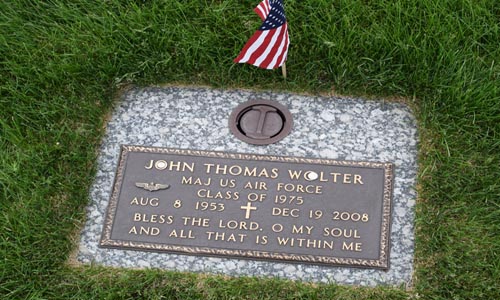 |
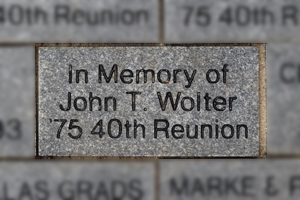 |
 |
 |
